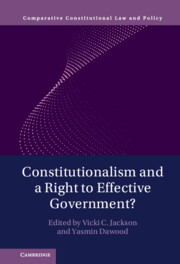Book contents
- Constitutionalism and a Right to Effective Government?
- Comparative Constitutional Law and Policy
- Constitutionalism and a Right to Effective Government?
- Copyright page
- Dedication
- Contents
- Tables
- Contributors
- Acknowledgments
- Part I Introduction
- Part II What Are Constitutions For?
- Part III Positive Rights and Rights to Effective Self-Government
- Part IV The Role of Courts in Building State Capacity and Promoting Effective Self-Government While Protecting Rights
- 9 The Unconstitutional State of Affairs Doctrine
- 10 Courts and Effective Governance
- 11 The New Managerialism
- Part V Executive and Administrative Constitutionalism in Effective Democratic Government
- Part VI Legislatures, Representation, and Duties of Effective Self-Government
- Part VII Politics, Sociology, Media, and Corruption as Contexts for Constitutionalism and Governance
- Index
10 - Courts and Effective Governance
from Part IV - The Role of Courts in Building State Capacity and Promoting Effective Self-Government While Protecting Rights
Published online by Cambridge University Press: 20 October 2022
- Constitutionalism and a Right to Effective Government?
- Comparative Constitutional Law and Policy
- Constitutionalism and a Right to Effective Government?
- Copyright page
- Dedication
- Contents
- Tables
- Contributors
- Acknowledgments
- Part I Introduction
- Part II What Are Constitutions For?
- Part III Positive Rights and Rights to Effective Self-Government
- Part IV The Role of Courts in Building State Capacity and Promoting Effective Self-Government While Protecting Rights
- 9 The Unconstitutional State of Affairs Doctrine
- 10 Courts and Effective Governance
- 11 The New Managerialism
- Part V Executive and Administrative Constitutionalism in Effective Democratic Government
- Part VI Legislatures, Representation, and Duties of Effective Self-Government
- Part VII Politics, Sociology, Media, and Corruption as Contexts for Constitutionalism and Governance
- Index
Summary
Governments are put in place to carry out policies. Effective governance means that they have the capacity to implement those policies. As Samuel Huntington observed, “[t]he most important political distinction among countries concerns not their form of government but their degree of government.”1 For our purposes, state capacity is the ability of a government-in-place to develop and implement policies that its leaders believe will improve national well-being. The capacity to govern includes having the required material resources, the personnel for whatever is necessary to deliver the policies to their beneficiaries, and a bureaucratic organization that enables high-level officials to implement policies.
How does state capacity feature in constitutional adjudication? And how can courts contribute to effective governance? Of course, they can interpret constitutions and statutes to authorize government officials to use whatever capacity they have to implement their chosen policies.
- Type
- Chapter
- Information
- Constitutionalism and a Right to Effective Government? , pp. 124 - 134Publisher: Cambridge University PressPrint publication year: 2022

